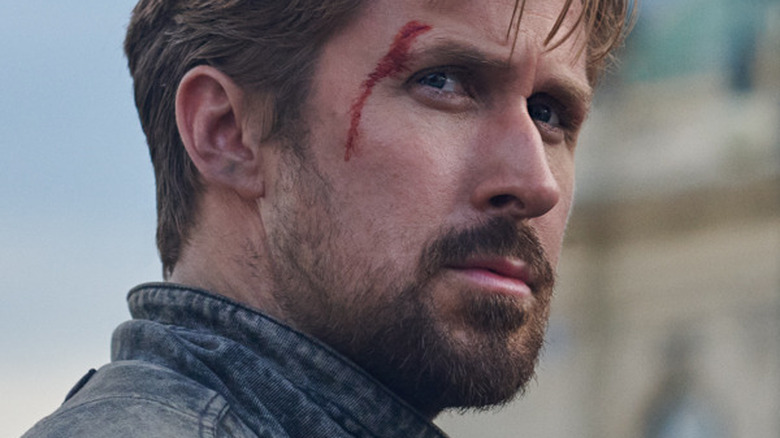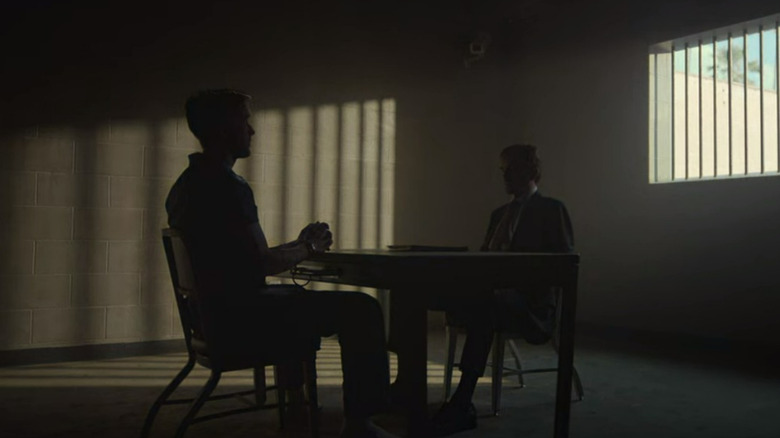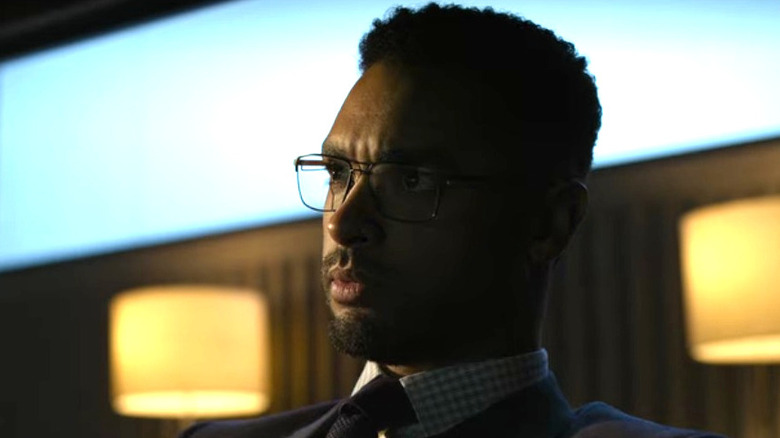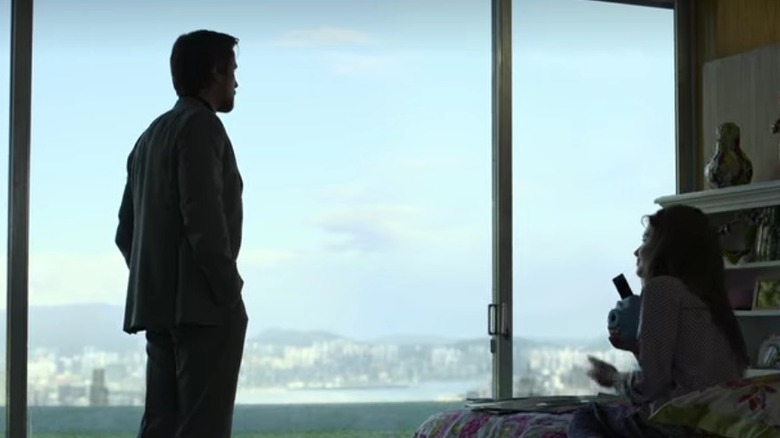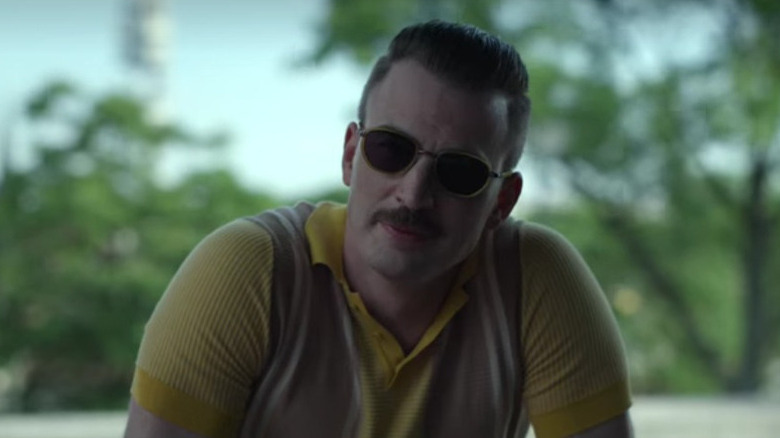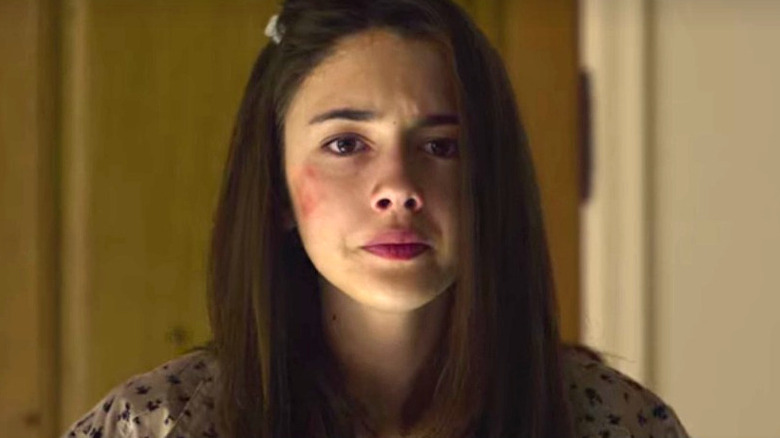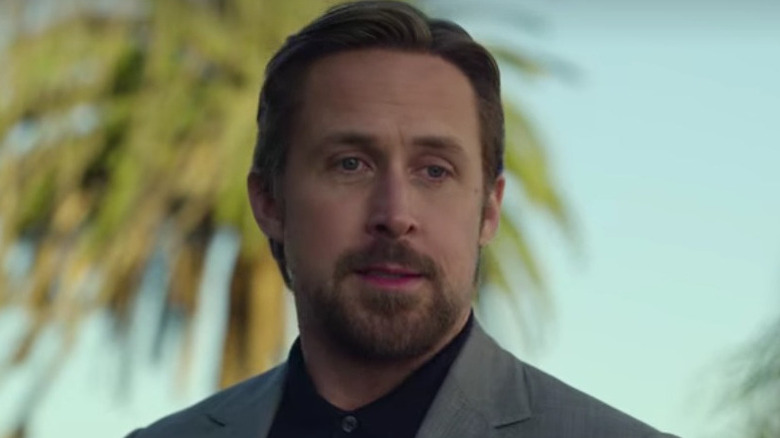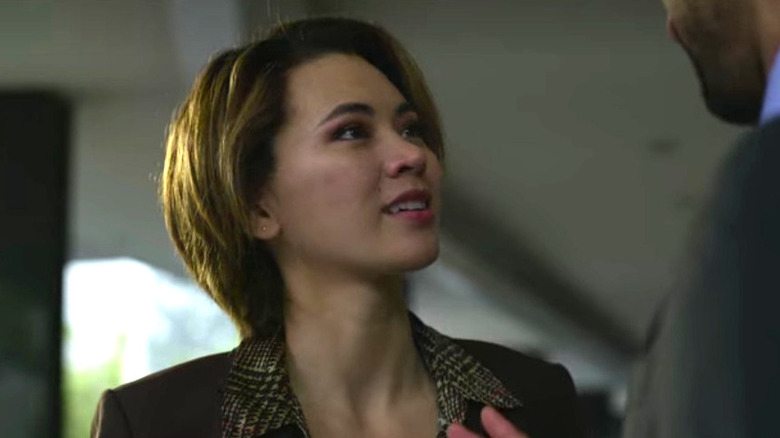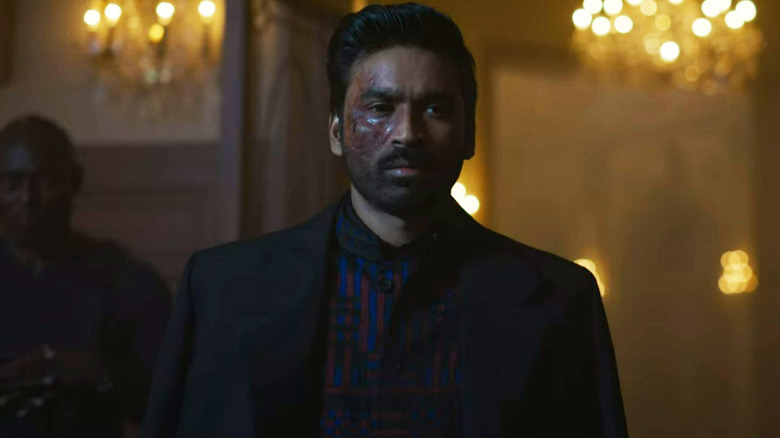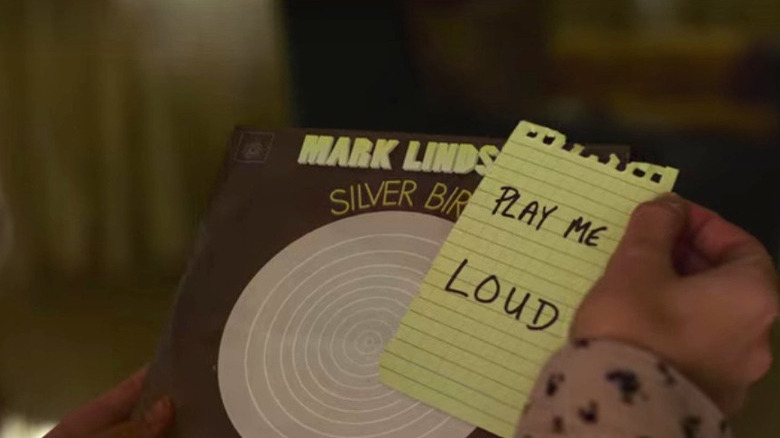The Ending Of The Gray Man Explained
"The Gray Man" stars Ryan Gosling as Six, aka the titular Gray Man, a nickname given to elite agents of a super-secret CIA task force known as the Sierra program. After he's ordered to kill a fellow Sierra agent, Six learns that the people he works for are more corrupt than the targets he's sent to eliminate. This stunning realization completely destroys his career as he knew it. Soon, Six is running for his life as the most dangerous killers in the world hunt him down.
With the reluctant help of a CIA agent named Dani Miranda (Ana de Armas), Six manages to stay alive. Not only that, he attempts to save the niece of his former mentor Fitzroy (Billy Bob Thornton) while being pursued by Lloyd Hansen (Chris Evans), a demented torturer-for-hire who takes a whole lot of hideous pleasure in his job. This results in a fast-moving thriller with all kinds of pulse-pounding twists and turns. "The Gray Man" is so packed with action, in fact, that you might end up with some lingering questions about it — especially its complex ending. From character motivations to themes to hints at a sequel, we're here to explain the ending of "The Gray Man."
Warning: Major spoilers ahead for 2022's "The Gray Man."
Six likes life on the right side of the bars
When we first meet Six, he's just a young man named Courtland Gentry doing jail time in Florida State Prison for murdering his abusive father when he was 15. He isn't eligible for parole until 2031, but a member of the CIA named Donald Fitzroy gives him the chance to walk out of prison for good if he kills bad guys on behalf of the agency's Sierra program. Courtland agrees.
We rejoin Courtland 18 years later. He no longer has a name, instead going by the number Six. His job is to exist in the gray zones of life. This means he isn't exactly an individual — he's more of a tool of the United States government, used to carry out covert operations they would rather the public know nothing about, like assassinations. It's a dangerous life, naturally, but Six takes everything in stride. He's not a particularly emotional man, and is entirely matter-of-fact about his work.
How is he able to put his life on the line without having a nervous breakdown? As he says to Fitzroy after learning he will likely die instead of retiring, "Beats being on the wrong side of the bars." Even though his life as an assassin is beyond difficult, at least he's not stuck in a jail cell being punished for a justifiable murder. Instead, he gets to protect people, just like he protected his little brother from the hands of their monstrous father.
Out with the old, in with the corrupt
We learn exactly what kind of man Denny Carmichael (Regé-Jean Page) is from the moment he orders Six to take out a target regardless of the fact that a child will be hurt in the process. This is someone who demands his orders be followed without question and likes to keep his secrets buried six feet underground. The details aren't completely clear, but we also learn that he forced his way into his current position, sending Fitzroy into an early retirement.
Carmichael's goal is to run things his way, which includes performing unsanctioned assassinations with private hitmen, rather than agents employed by the U.S. government. The mission that opens the movie sees Six kill Four, another Sierra agent, because he's selling information to America's enemies that documents Carmichael's corrupt activities. Six takes the encrypted drive that contains this information and mails it to an ally named Margaret Cahill (Alfre Woodard). Once decoded, the drive reveals Carmichael's attempts to eliminate the CIA as it currently exists and rebuild it on his own terms.
It's this corruption that makes Six go rogue. Although he never explicitly says it in the film, all of his decisions reveal that he does what he does because it's the right thing to do. Learning that the new people in charge are only interested in protecting themselves motivates him to step out of the gray for the first time in 18 years and start doing things his way.
Six, the guardian angel
In a flashback set two years before the main events of the film, Fitzroy's address is leaked online. This is a major problem: The nature of his job means he has a lot of enemies who won't hesitate to murder him or his niece Claire, whom he's raised since the deaths of her parents. Denny Carmichael will not provide them with a security team, so Fitzroy and Cahill turn to Six for assistance.
All Six has to do is keep Claire alive. From what we know about Six at this point, we can tell he approaches each job with emotionless precision. That's exactly how he starts off his babysitting gig. But Claire was born with a heart condition and needs a pacemaker. When it malfunctions, we see a subtle change in the gray man's demeanor. He isn't just looking after Claire because he has to — he actually cares about her.
After she's released from the hospital, Claire mentions that Fitzroy is the only family she has left. Six says Fitzroy is the closest thing he has to family at all. Claire wonders if this makes them family in some way. Given the fact that Six killed his own father to protect himself and his brother, and the passion with which he takes on a horde of professional killers to keep Claire safe, it seems he truly does consider her to be his kin.
Lloyd Hansen really likes hurting people
Carmichael's information exists on an encrypted drive that's hidden inside of a medallion. When Sierra Four gives Six the drive, he asks him to use it to take Carmichael down. Knowing that a dangerous man who knows how to disappear is carrying the data that could end his career and get him locked up for the rest of his life, Carmichael turns to a killer named Lloyd Hansen to make sure Six dies as quickly as possible.
Essentially, Hansen is everything Six isn't. While Six is a measured and calculated person, Hansen is loud, emotional, and reckless. He flaunts his wealth, relishes torturing people, and hates cats. Carmichael seeks his help because they were buddies at Harvard, and he knows Hansen will do whatever it takes to get the job done. If that means killing loads of innocent civilians, well, so be it.
As is often the case with heroes and villains, Six and Hansen are twisted mirror images of each other. Both men kill for a living and do so with relative ease. Both are relentless in pursuit of their goals. Hansen even says he thinks he and Six could have been friends. There's one major difference, though: Six does his job because it's right. Hansen, in contrast, does it for kicks and the boatloads of money it makes him. There is no gray area when it comes to Hansen: He is evil, and Chris Evans plays him as such.
Dani Miranda makes her choice
Dani Miranda's first words in "The Gray Man" are said in Bangkok. She approaches Six and asks, "Do you need anything?" Although she doesn't know it yet, this sets up the fact that she will be Six's ally for the rest of the film. To her, this is just another job for the CIA. When things go sideways and Six takes matters into his own hands, however, she's forced to make a pivotal choice.
Miranda is exceptionally professional, but there's a part of her that knows something is deeply wrong with the CIA. Yet she takes their abuse and follows orders — until meeting Six wakes her up. By all accounts, when Six goes on the run, she should step away and let Carmichael do his job. But she chooses to help Six, just like she chooses to ignore a dismissal from other agents following the murder of Sierra Four.
After saving Six from Lloyd Hansen, she tells him that his actions have had a negative impact on her career, because they've made Carmichael think she and Six planned to steal the information. But when Six points out that the CIA has been killing its own agents and she might be next, she decides to help him find out what's on the encrypted drive. Seeing that Carmichael has been carrying out unsanctioned hits, she officially aligns herself with Six to take Carmichael down. This is more important than her career.
The new mission
Once Lloyd Hansen is hired to find the drive and kill Six, he determines the most effective way of doing so is by going after Donald Fitzroy. As the film firmly establishes, Fitzroy is basically the father Six never had, which makes him the only person Six truly trusts. Assuming Fitzroy will have information on Six's whereabouts (which he does, since he puts together an extraction team to pick him up), Hansen kidnaps his niece Claire and threatens to kill her.
Fitzroy orders the team to kill Six to protect Claire, but he survives — just as Fitzroy knows he will. He tells his de facto son about Claire's capture, and from that moment on, Six isn't as concerned with surviving as he is with saving Claire. We see in flashbacks that the abuse Six suffered at his father's hands numbed him to pain. This was the old man's intent: He believed that ignoring pain would make Six succeed in life. While it's certainly true that pain doesn't seem to bother Six (he's positively blasé about most of his horrific injuries), he can't sit by and allow innocent people to experience it. He protected his little brother in 1995, and now his little sister needs his help. Every decision he makes from here on out is to get to Claire. This is his new mission, and he'll do anything, go anywhere, and kill anyone to carry it out successfully.
Sisyphus and Six
When Six babysits Claire, she notices his tattoo. Since she's incredibly inquisitive, she asks him an onslaught of questions about its meaning. He explains that it's a man's name in Greek. This particular man was condemned by the gods to push a rock up a hill for all eternity. If you're familiar with Greek mythology, you will have probably already picked up on the fact that he's talking about Sisyphus. According to the World History Encyclopedia, Sisyphus was a trickster king who cheated death not once, but twice. His fruitless boulder-rolling was his punishment, as dictated by Zeus.
Claire asks Six if Sisyphus liked pushing the rock uphill, and Six tells her he probably didn't. When she asks if he ever made it to the top of the hill, Six laughs and says, "I'll let you know." This conversation — particularly Six's final answer — suggests that Six identifies with Sisyphus. In fact, you can see the entire film as a Sisyphean story. Did Sisyphus really deserve damnation for wanting to prolong his own life? Does Courtland Gentry really deserve to go to prison for wanting to keep himself and his brother alive? "The Gray Man" suggests the answer is no. Fitzroy even says he would've done the same thing in Courtland's shoes. Therefore, Six's life as a CIA agent is his version of pushing a rock up a hill: It's an eternal punishment for a justifiable crime.
The truth about Suzanne Brewer
There are three major antagonists in "The Gray Man." The first two are fairly obvious. Denny Carmichael is the villainous ringleader, who sends forth a horde of minions to do his dirty work. Lloyd Hansen is his wild, unpredictable, and borderline rabid hound, who chases (and kills) everything in sight. But the third antagonist isn't revealed until the climax of the third act, even though she's been there the whole time. She's Suzanne Brewer (Jessica Henwick).
For most of the film, Brewer, who is yet another CIA agent, appears to be a cool head in a hot situation. She contradicts nearly every call Carmichael makes (especially when he brings in Hansen) and never hesitates to point out people's nonsense. In the end, when Hansen and Six are fighting to the death, she ends Hansen's life. It seems as though she intends to help Six — but in truth, she has her own plans.
Brewer intends for Hansen to take the fall for everything that's happened. It will look like he stole the information himself in the hopes of using it for his own gain. All she needs to achieve this is for Six, Miranda (who likely has ulterior motives), and Carmichael to corroborate her story. They do, and everything goes off without a hitch. The drive is even destroyed, to make sure the information never gets out. The one mistake she makes, however, is keeping Claire as a hostage so she can control Six.
Good guys vs. bad guys
Hansen puts a hit on Six that's so big, every professional killer in the world wants to end him. Yet even in this crowd, bounty hunter Avik San (Dhanush) manages to stand out. He shows up after a car chase in a public area, which results in millions of dollars' worth of damage. Worse, Six gets away. When Avik arrives, he becomes Hansen's last hope.
Avik is as good at his job as Six and Hansen are at theirs. He hunts Miranda and Six with the patient tenacity of a Terminator. He cannot be stopped, and pain doesn't get in his way. In this, he and Six are very similar. Honor also ties them together: When Miranda and Six storm the Croatian headquarters where Hansen has Claire and Fitzroy, Avik gives up the fight. He lets Miranda have the encrypted drive and says he doesn't care about the money anymore, because he's learned Hansen's team has no honor.
This, in essence, is the film's theme: honor vs. dishonor, or, good guys vs. bad guys. Several times, targets are referred to as "bad guys," even when they might not be all bad. It all boils down to motivation: Hansen kills for pleasure, Carmichael kills for power, Brewer kills for influence, Six and Miranda kill to protect people, and Fitzroy kills to save his niece. A dichotomy is clear, between those who kill selflessly and those who kill selfishly. This is the film's understanding of good and evil.
Let's get loud
Hansen is killed and blamed for the events of the film. Miranda's position with the CIA is restored, but she might be planning something else. Carmichael destroys the drive and retains his position. Six is put in custody. Brewer is pretty confident that because she has Claire, she can make Six do whatever she wants. Unfortunately for her, Six still has a mission: Protect Claire at all costs.
Several characters in "The Gray Man" refer to things going wrong as "getting loud." These are people who are supposed to operate in the hushed shadows, unnoticed by the rest of the world. Drawing attention, as happens when someone or something produces a loud noise, is the worst thing they can do. But Courtland Gentry is done being quiet. The CIA is corrupt, and he's not going to work on its behalf any longer. Instead, he's going to cast aside his Sisyphean rock and take his life into his own hands.
How do we know he's going to do this? He escapes from the hospital, kills everyone he encounters, and tracks down Claire. She finds a note from him telling her to play a record loud. This blocks out the sounds of violence just outside her door, but it also signifies Six's intentions: The time to be quiet is over. If there's a sequel, we might see how loud Courtland Gentry can really get, now that he finally has his family and his freedom.
